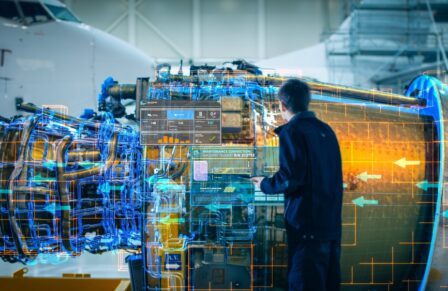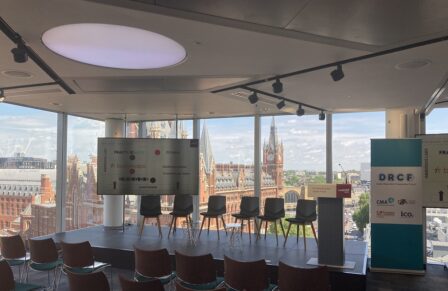National Cyber-Physical Infrastructure leads cross-sector collaboration for connected digital twin, robotics and metaverse innovations
Posted 18 Oct 2023
A new government and industry collaboration to amplify innovations, break down silos and build a shared vision for cyber-physical system innovation in the UK.
Digital Catapult, Connected Places Catapult and the High Value Manufacturing Catapult have announced a joint collaboration to develop the emerging National Cyber-Physical Infrastructure (NCPI) ecosystem in the UK – funded and supported by the Department for Science, Innovation and Technology (DSIT). This builds on the foundations of the UK Government’s Cyber-Physical Infrastructure Consultation published in March 2022. In the next 10-15 years, the world will begin to see more combinations of advanced digital technologies such as AI, extended reality (XR), robotics, distributed ledger technologies and 5G/6G, that will connect physical and digital environments together into advanced “cyber-physical” systems. New capabilities that emerge from these combinations of technologies will create a wave of innovation that will transform the way we live and work.
These cyber-physical systems are developing in complexity and will fundamentally change our relationship and interaction with data, including:
- Robotic and autonomous systems are already revolutionising industries like manufacturing and agriculture to enhance productivity and safety for repetitive tasks with precision and potentially within hazardous environments reducing operational costs.
- Smart city infrastructure is continuing to expand usage of data driven decision making to reduce carbon footprint, optimising traffic management and town planning to increase citizen safety and quality of life, including areas such as air quality /CO2 emissions.
- Digital twins are fit for purpose digital representations of physical assets, environments or processes, underpinned by a data model with synchronisation between the physical and digital elements. These are already helping to improve predictive planning, next-generation design and supply chain optimisation.
- The extended reality enabled ‘metaverse’ (enabled by virtual, augmented and mixed reality) will allow us to interact with data layered over the physical world as an extension of the internet, enabling immersive experiences, learning environments and new ways to access information about our surroundings;
Connecting advanced cyber-physical systems can provide a step-change in the value individual systems can bring, enabling cyber-physical systems to break down silos in sectors and increase our understanding of systems of systems challenges. While individual applications of cyber-physical systems bring specific benefits, the networking and federation of these systems will create significantly greater value for society, economy and the environment.
Connected systems will bring together innovators in industry and academia, government and wider society to work together to solve systemic challenges, such as reaching net zero, by allowing multiple parties to collaborate, share information and make collective decisions. By allowing for better visibility of data across systems (e.g. sharing CO2 emissions across organisations), and encouraging greater interoperability, Cyber-Physical Infrastructure can improve productivity across key sectors, enable increased public spending efficiency, enhance delivery of infrastructure and health services, build national resilience, and accelerate progress in attaining national policy objectives, such as net zero. More broadly, Cyber-Physical Infrastructure can help remove time, cost and risk from the process of bringing innovation to market.
To realise this new era of advanced digitalisation, the UK requires a step change to accelerate innovation and the development of infrastructure that underpins it.
Building a cyber-physical system innovation ecosystem
In the UK and globally, it is essential that we build a collective vision for a more equitable, secure, responsible and resilient future state for cyber-physical system innovation, that will benefit everyone involved, set the frameworks to develop interoperable systems, and showcase the best-in-class examples of innovation.
The NCPI will be a first step towards developing this vision in the UK. Funded by the UK Government Department for Science Innovation & Technology (DSIT), the NCPI Ecosystem is jointly led by Digital Catapult, Connected Places Catapult and the Digital Twin Hub, and the High Value Manufacturing Catapult (all part of the UK’s Catapult Network).
The NCPI initiative will help develop the groundwork for future initiatives in this space, establish discussions between key stakeholders and be a national and international front door for future developments in this area.
The range of industrial initiatives in this space has grown increasingly fragmented with many bespoke initiatives. The unique position of the Catapults as technology and commercially agnostic players in the centre of the landscape, makes them ideally placed to help cross-sector industrial and tech companies collaborate. We’re excited to usher in the second generation of cyber-physical systems which will need increased openness and interoperability.
Jeremy Silver CEO, Digital Catapult
The NCPI programme is focused on our ability to bring together data from the physical world and deliver clear understanding in digital form through connected digital twins, robotics and metaverse innovations. We have the principles and foundations – with relevance across the built environment and further – and move forward with a strong mandate to combine knowledge and expertise to enable an ecosystem that will fast-track digital technology, boost economic growth and create a better world.
Nicola Yates CEO, Connected Places Catapult
The National Cyber-Physical Infrastructure initiative is a great opportunity for interested organisations to come together to solve challenges that exist across sectors. Our world is changing and taking physical data to build digital solutions is critical to our national competitiveness. Through greater collaboration and knowledge sharing we will unlock innovation and develop guidance that will help organisations of all sizes to benefit.
Katherine Bennett CEO, High Value Manufacturing Catapult
The technologies that power a modern economy are often underpinned by complex physical and virtual foundations which help them function – whether that be environmental sensors or wireless networks for transferring data. Building a Cyber-Physical Infrastructure is all about creating a more connected, innovative, and resilient UK, where these sophisticated systems can work seamlessly together. We look forward to seeing what the X-Catapult Consortium can do to foster more cooperation and collaboration in this space.
George Freeman MP Science and Technology Minister
Launch event: Cyber-Physical Future Forum
The partners will launch the NCPI at a half-day hybrid event, the Cyber-Physical Future Forum, at Connected Places Catapult in London on Thursday 16 November 2023. The event will outline plans to grow the cyber-physical ecosystem and feature keynote speeches from industry guests, covering the challenges and scientific areas central to enabling industry innovation. This will be followed by an interactive workshop session for more detailed discussion on the key topics. The event is by invitation for in-person attendance due to venue size.






